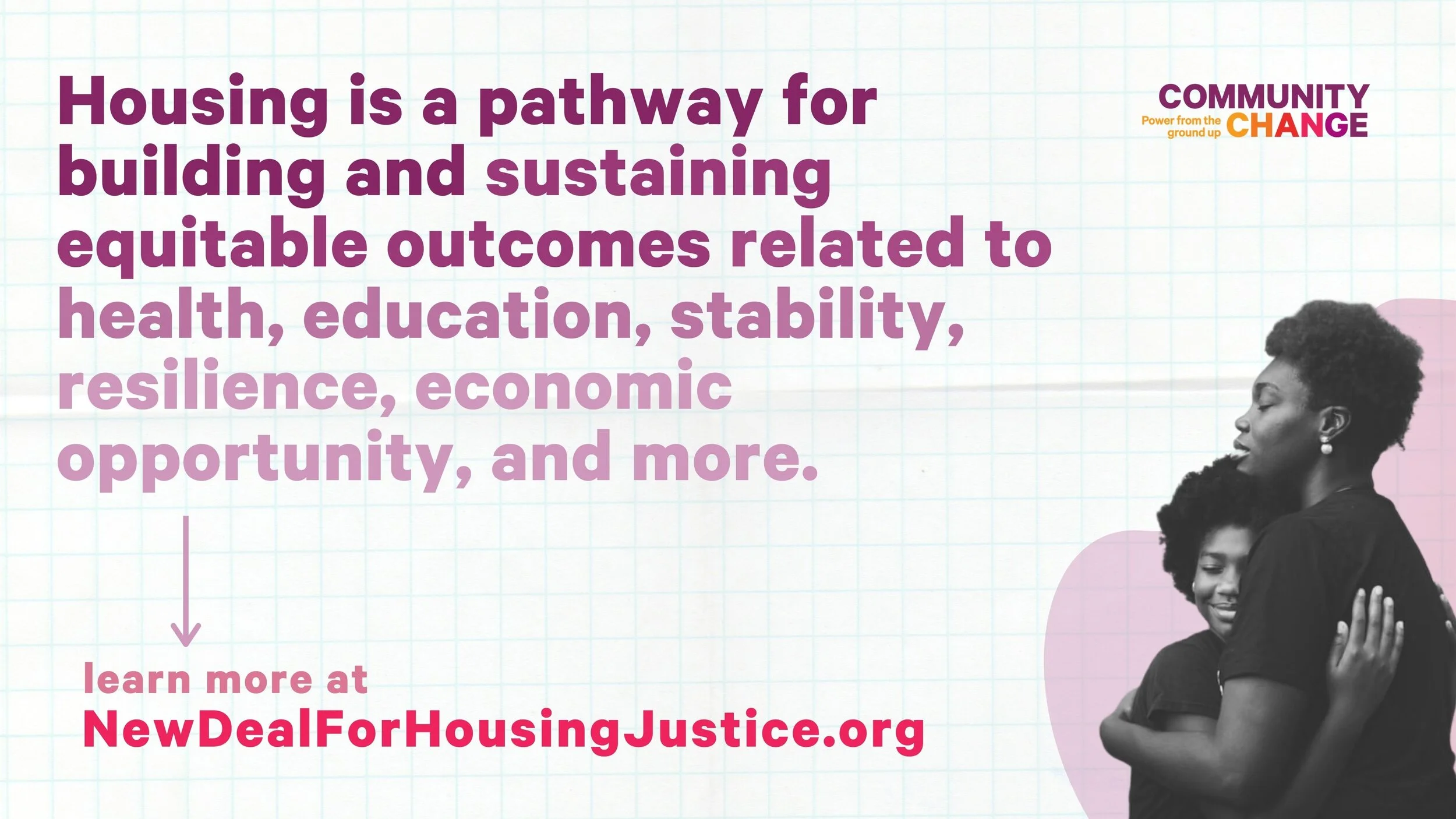A New Deal For Housing Justice
MZ Strategies is proud to be one of the contributing authors to the “New Deal for Housing Justice” Playbook released today by Community Change, a national organization that builds the power of low-income people, especially people of color, to fight for a society where everyone can thrive. The incredible Lynn Ross, Founder and Principal of Spirit for Change Consulting managed the Playbook development process and assembled a team of advisors, authors, and process to engage grassroots leaders working at the forefront of housing justice. The Honorable Julián Castro, former Secretary of Housing and Urban Development, Maria Torres-Springer, Vice President for U.S. Programs, Ford Foundation, and Dorian Warren, President, Community Change served as co-chairs in developing the Housing Justice Playbook.
The New Deal for Housing Justice is a playbook for federal policy change that centers racial equity. It puts forth policy recommendations, which are largely actionable within the first 200 days of the new Biden Harris Administration. Lived experiences and input from hundreds of grassroots leaders and stakeholders informed all aspects of the playbook, which lays out five key areas of action:
1. Take Administrative Action to Reverse Discriminatory, Racist Policies. ● Affirmatively Furthering Fair Housing. Reinstate a reversed rule requiring communities to analyze racial residential segregation and submit plans to remedy it as a condition of receiving federal housing aid. ● Disparate Impact. Terminate rulemaking to loosen the discriminatory effects standard. ● Mixed-Immigration Households. Overturn a proposed rule prohibiting “mixed-status” households from living in public and HUD-assisted housing. ● Public Charge. Overturn a proposed anti-immigrant rule that considers public housing and other public benefits as a public charge. ● Equal Access. Terminate rulemaking that allows homeless programs to discriminate against transgender and non-gender conforming people. ● Reentry and Housing. Recirculate Obama era guidance on the treatment of people with criminal records seeking to access federal housing assistance. ● Systemic Racism and Sexism. Reverse the executive order on “race and sex stereotyping” that prohibits federal agencies and contractors from training and engaging in dialogue related to racial equity, diversity, and inclusion.
2. Provide Immediate Relief for renters, including undocumented immigrants, and homeowners by prioritizing income and housing relief programs in the first 100 days of the new Administration, and continued cash payments. ● Expand Housing and Health Care Initiatives to address racial and health equity during the COVID-19 pandemic and in the future. An equity task force must be composed of housing advocates and other community partners to make recommendations. ● Include a Federal Eviction Moratorium as a standard part of a federal disaster declaration in order to stop local evictions for the duration of the pandemic. ● Increase Housing Assistance and add 100,000 new units to the Housing Choice Voucher program; and provide new emergency funding for Indigenous people. ● Grow Community Ownership Models to gain community control of foreclosed and abandoned properties to be put to equitable use.
3. Invest in a Just Budget. ● Center Racial Justice in the President’s Budget, that builds community wealth and social housing, increases Black, Latinx, and Asian immigrant homeownership, ends exclusionary zoning, protects tenants, and enacts anti-displacement efforts. ● National Recovery. Accelerate national recovery by investing $1.25 trillion in infrastructure and the environment, including clean water funds, rural rental housing programs, as well as economic development and disaster recovery programs. ● Public Housing. Invest $75.6 million to eliminate the repair backlog in public housing, remediate mold, lead paint, and other toxic conditions that injure the health of families. ● Housing Trust Fund. Invest an additional $20 billion in the national Housing Trust Fund to support building, rehabilitating, preserving, and operating rental housing. ● Transportation. Create an Office of Transit-Supportive Communities focused on equitable transportation to add access and needed amenities in higher poverty areas. ● Workforce. Launch a White House-led initiative to expand place-based economic mobility focused on workforce programs as well as increased earnings and savings.
4. Empower Commissions and Task Forces. ● Presidential Commission on Reparations to create actionable goals for reparations to Black people for a legacy of anti-Black federal housing policy. ● Presidential Commission on Social Housing to explore social housing options to expand community ownership models and improve and increase public housing stock. ● White-house led Task Force on Upward Economic Mobility to create pathways for upward economic mobility for low-income families. ● Regional Equity and Innovations Task Force to promote interagency actions to reduce the economic and racial segregation that drives much of the nation’s racial wealth gap. ● Commission to Restore Trust to confront decades of systemic oppression, racism, disinvestment, and a lack of transparency between residents of federally supported affordable rental housing and public housing authorities, landlords, and HUD. ● HUD-ED Task Force to address the common goal of improving access to higher-performing schools by grappling with housing segregation and school segregation simultaneously.
5. Center Lived Experiences, Change Systems. ● An Intersectional Framework must be adopted to view housing justice within a broader justice framework that intersects with social safety net programs, health, education, criminal justice, and many other policy areas. ● Systemic Analysis is necessary to reframe homelessness as a symptom of systemic inequity as opposed to an individual-level problem. ● Commit to a Federal Homes Guarantee to build 12 million housing units, eradicating homelessness, protecting renters through a national tenant bill of rights, a national rent cap, and nationwide tenant screening protections. ● Create an Office of Equitable and Resilient Communities to catalyze more coordinated local and regional approaches to housing, health, economic development, and mobility with a focus on reducing disparities. ● Launch a Universal Basic Income Program pilot to reduce economic insecurity and provide regular cash payments with no requirements from recipients.
Within his first two days in office, President Biden took executive action that supports housing justice principles including extending the CDC eviction moratorium and enabling states and communities to address the urgent health and housing needs of people experiencing homelessness during the COVID-19 pandemic. This is just the tip of the iceberg.
Our nation, for too long, has avoided the growing housing crisis, with the impacts especially borne out by Black, Brown, Indigenous and other people of color. The racial gaps in home ownership, household wealth, housing cost burden, and housing insecurity have never been greater. Urban and rural households are struggling to meet rising housing costs. Communities are struggling with how to adequately increase the supply of affordable housing, especially for very-low incomes but also for those with disabilities, those with families, and other vulnerable populations.
The COVID-19 pandemic has made it clear that housing policy is health policy. The Great Recession of 2008 showed that housing policy is economic policy. And as we see repeatedly with each new natural disaster, housing policy is climate policy. It is long past time for federal action. Thankfully there is a diverse and growing bevy of local leaders who have emerged with solutions that center housing policy in ways both practical and transformative.
In writing the Playbook, we elevated intersectional strategies both in what we recommended and in how we developed the content. Our housing recommendations are not just focused on HUD, but on the many federal agencies who influence housing policy and in turn are influenced by the failure of policy to consider the linkages between issues, especially as they relate to racial equity, wealth building, and environmental impacts. My work for the Housing Justice Playbook, focused on two major policy questions:
How might the federal government advance housing policies that support individual and community resiliency in the face of a changing climate, natural and human-caused disasters, economic downturns, and global health crises? (Section 2 of the playbook, beginning on page 26)
How might the federal government reimagine its approach to equitable and resilient communities? (Section 10, beginning on page 137)
In researching housing issues and talking with stakeholders it was stunning to hear time and again the inability to center our federal housing policy on meeting the needs of the most vulnerable. This is not a new phenomenon created by the outgoing Trump administration but a legacy that stretches back for decades. Most FEMA programs, for instance, do not serve those who live in mobile homes or who are renters. In fact, many of their programs don’t even consider these groups eligible for assistance but rather target assistance to the land owner not the tenant. We do not have standard resiliency building standards across federal agencies, or even a federally authorized emergency recovery program for housing to provide consistency and speed up recovery efforts. We do not have a racial or health equity screen in creating federal policy or evaluating regulations or federal investments thus continuing persistent inequitable outcomes that often hit BIPOC households and communities the hardest. The housing needs of rural America are severe and growing, yet their Congressionally-elected officials have failed to ensure federal programs are designed to meet their needs. Instead GOP leaders portray support for affordable housing, vouchers, and other housing assistance as socialism or liberal policies that only support Black inner city residents. This political narrative is not only false, but plays into white supremacist policies that ultimately fail both Black and non-Black families, as well as urban and rural communities.
Going forward we must frame housing policy. This includes the following principles put forth in the NewDealForHousingJustice.org:
Housing is a human right and housing policy must guarantee that everyone has a safe, affordable, healthy place to thrive.
Housing policy must put people first by centering decision-making on the individuals and communities who are most impacted by federal housing policy.
Housing is critical community infrastructure that must be planned, designed, operated, and budgeted for as a public good.
Housing policy must embed and pursue approaches that are equity focused, anti-racist, and anti-discriminatory.
Housing is a pathway for building and sustaining equitable outcomes for individuals and communities related to health, education, stability, resilience, economic opportunity, and more.
MZ Strategies, LLC looks forward to supporting and aligning with federal, state, regional and local partners to put these principles into action and realize housing justice for all. Deep gratitude to Lynn Ross, Community Change, the Ford Foundation and my incredible co-authors for taking this journey with me to launch the Playbook. Now our real work begins!



